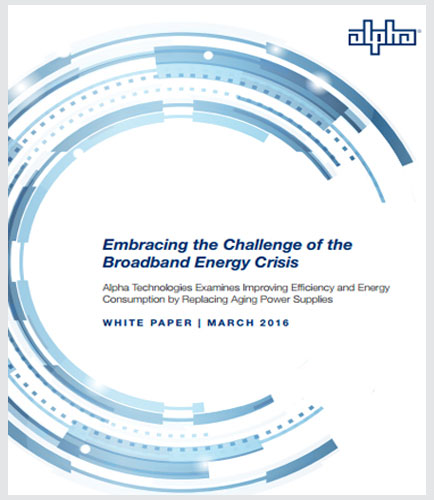
PROCESSING. PLEASE WAIT...



White Paper: Alpha Technologies
Embracing the Challenges of Broadband Energy Crisis
Key components to improve energy efficiency are technologically advanced and more efficient power supplies that can help in reducing energy consumption . Even though the broadband industry is largely focused on the rapid global expansion of broadband networks and its offerings, growing broadband energy consumption has not gone unnoticed.
Growing Demand to manage Energy Crisis: Decreasing energy consumption and energy costs
Improving Line Efficiency: Reduce energy waste to improve energy efficiency
Output Voltage and Regulation: To reduce network cable loss
Improving Inverter Efficiency: Increases battery run-time and reduces battery string count
Power Supply Monitoring: Optimization of the power supply and the broadband network
Read this insightful whitepaper that brings you the ways to improve energy efficiency and embrace the challenges of broadband energy crisis.
By: Crystal Group
All of the power supplies tested passed the thermal, stress test, and low/high voltage operation criteria at 440 Hz. However, there is one very important parameter that must be considered in deeming a power supply appropriate for operation in a 400 Hz environment. This parameter is known as power factor, commonly abbreviated as PF. The higher the PF (desired), the lower the reactance and the more current is in phase with the voltage. The lower the PF (undesired), the higher the reactance and the more out of phase is the current with respect to the voltage. The purposes of this whitepaper are: to provide confidence in claiming compliant operation outside the stated vendor specifications, namely at 400 Hz, suitable for use with airborne power buses to provide compliance with margin and eliminate borderline passing scenarios to provide insights on the supplies that are 400 Hz compatible
By: Zywave
Providing a total risk management solution is an important aspect for P&C brokers apart from focusing on coverage and obtaining the best price for your client. Clients are looking for brokers that can take on a trusted advisor role, helping them address their true business exposures and help mitigate their total cost of risk. With the right resources, one can offer prospects and clients effective risk management processes which address all of the issues, create value, and become an integral part of their decision-making process. This whitepaper provides steps that should be taken to move towards becoming a trusted risk management advisor for your clients by managing their total cost of risk and providing solutions to help them save money on their long-term risk management costs. It addresses the following key questions: How does risk management impact a business’s bottom line? What are the employers’ top 3 risk management challenges? What are the most effective ways through which a broker can take on the advisor role? Deliver a total risk management solution to your clients and you’ll find yourself with a new business model that makes both you and your clients more successful.


 2024 All Rights Reserved | by: www.ciowhitepapersreview.com
2024 All Rights Reserved | by: www.ciowhitepapersreview.com